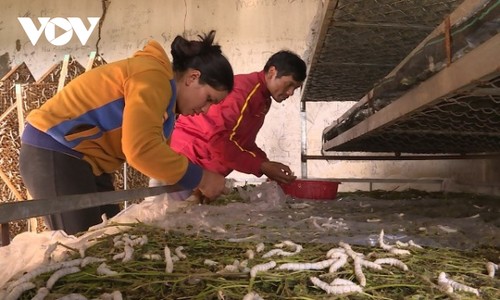 Many ethnic minority households in Lam Dong province have escaped poverty and had improved living conditions thanks to sericulture. Many ethnic minority households in Lam Dong province have escaped poverty and had improved living conditions thanks to sericulture. |
Since the family of Ka Loan of Lam Ha district converted their coffee farm into a silk farm, their living conditions have markedly improved. Loan said a box of cocoons profits her family about 440 USD a month.
In the last two months of 2021, the price of cocoons increased to nearly 8.9 USD per kilo, ensuring the family a prosperous Lunar New Year Festival, Tet.
“My family only has a few hundred square meters of land for growing rice and coffee. Our coffee trees produced only about three or four hundred kilos. Since we replaced the low-yield coffee trees with mulberry, we’ve started to earn considerably more money,” said Loan.
The family of K’Du of Di Linh district has also benefited from breeding silkworms. K’Du told VOV that since he learnt the trade at classes offered by the district Farmers’ Association, his income has increased.
He said selecting hybrid mulberry varieties with high yields and good quality was a decisive factor in boosting productivity. Silkworm cocoons earn his family more than 880 USD a month.
“Thanks to the funding of the district Farmers’ Association to set up the necessary facility, plus my family’s land for mulberry plantation, our living conditions have been more stable. Each crop produces half a box of cocoons and I plan to expand the mulberry growing area,” said K’Du.
Sericulture has spread from Lam Ha and Di Linh district to other ethnic minority-inhabited areas in Lam Dong province.
Bui Thi Thanh Huyen, Deputy Chairwoman of a Farmers’ Association in Bao Lam district, said the model has helped many ethnic minority households escape poverty. Some have become quite well-off.
“Most local ethnic people are growing mulberries and raising silkworms because the harvest cycle is short. Two boxes of silkworms produce 100 kilos of cocoons, which currently sell for about 930 USD, but it only costs 53 USD for the production materials. It’s very easy to grow mulberries. Farmers only need to apply fertilizer twice a year, but they can harvest the leaves continuously,” said Huyen.
Following the initial success of the model, the Lam Dong provincial People’s Committee has approved a five-year plan for the local sericulture industry, which hopes to have 10,000 hectares of mulberry farms yielding 210,000 tons of mulberry leaves by 2023. That’s enough to produce 14,500 tons of cocoons and 1,900 tons of silk a year.